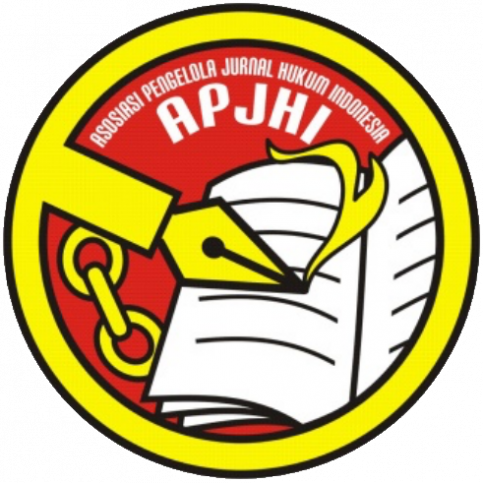AUTHORITY OF THE BOARD OF REGIONAL REPRESENTATIVES TO MONITOR AND EVALUATE THE DESIGN OF LOCAL REGULATIONS AND LOCAL REGULATIONS IN CONSTITUTIONAL PERSPECTIVE
Abstract
The Regional Representative Council has 3 powers as regulated in Articles 22D, 23E and 23F of the 1945 Constitution of the Republic of Indonesia, namely the powers of Legislation, Consideration and Supervision. The authority of the Regional Representative Council is expanded and added in Law No. 2 of 2018 concerning the People's Consultative Assembly, the People's Representative Council, the Regional Representative Council, and the Regional People's Representative Council, namely in Article 249 paragraph (1) letter j related to the Monitoring and evaluation of the Draft Regional Regulations and Regional Regulations. Normative juridical research method with a statutory approach. The purpose of this research is to find out and analyze constitutionally and legal problems that arise regarding the new authority of the Regional Representative Council. Based on the 1945 Constitution of the Republic of Indonesia, the new authority of the Regional Representatives Council is in the opposite direction because it is not included in the meaning of the 3 powers of the Regional Representatives Council which is referred to as the 1945 Constitution of the Republic of Indonesia. Legal problems that arise over the authority of the House of Representatives The area is an indication of rivalry between institutions, namely the Ministry of Home Affairs, the Governor, the Supreme Court and the Regional Representatives Council itself, this can be seen juridically, namely in the 1945 Constitution of the Republic of Indonesia, Law No. 23 of 2014 concerning Regional Government, Constitutional Court Decision No.137/PUU -XIII/2015 and No. 56/PUU-XIV/2016.
Keywords: Constitutional, The Regional Representative Council, Authority, Monitoring and Evaluation of Draft Regional Regulations and Regional Regulations
Full Text:
PDFReferences
Undang-Undang Dasar Negara Republik Indonesia Tahun 1945.
Undang-Undang Nomor 12 Tahun 2011 Tentang Pembentukan Peraturan Perundang-undangan.
Undang-Undang Nomor 30 Tahun 2014 Tentang Administrasi Pemerintahan.
Undang-Undang Nomor 23 Tahun 2014 Tentang Pemerintahan Daerah.
Undang-Undang Nomor 2 Tahun 2018 Tentang Perubahan Kedua Atas Undang-Undang Nomor 17 Tahun 2014 Tentang Majelis Permusyawaratan Rakyat, Dewan Perwakilan Rakyat, Dewan Perwakilan Daerah, dan Dewan Perwakilan Rakyat Daerah.
Putusan Mahkamah Konstitusi Nomor 137/PUU- XIII/2015 perihal Pengujian Undang-Undang Nomor 23 Tahun 2014 tentang Pemerintahan Daerah terhadap Undang-Undang Dasar Negara Republik Indonesia Tahun 1945 (2015).
Putusan Mahkamah Konstitusi Nomor 56/PUU- XIV/2016 perihal Pengujian Undang-Undang Nomor 23 Tahun 2014 tentang Pemerintahan Daerah terhadap Undang-Undang Dasar Negara Republik Indonesia Tahun 1945 (2016).
Peraturan Dewan Perwakilan Daerah Republik Indonesia Nomor 3 Tahun 2019 tentang Pemantauan dan evaluasi rancangan peraturan daerah dan peraturan daerah.
b. Buku-buku
Abdul Mukthie Fadjar, Tipe Negara Hukum. Malang, Jawa Timur. Bayumedia Publishing. 2004.
Amiruddin, Mengantar Metode Penelitian Hukum. Jakarta: PT Raja Grafindo Persada, 2006.
Jimly Asshidiqie, Perkembangan dan Konsolidasi Lembaga Negara Pasca Reformasi, Sekretariat Jenderal dan Kepaniteraan MKRI, 2006.
c. Karya Ilmiah dan Jurnal
Aan Eko Widiarto, 2015, “Ketidakpastian Hukum Kewenangan Lembaga Pembentuk Undang-Undang Akibat Pengabaian Putusan Mahkamah Konstitusi”, Jurnal Konstitusi, Volume 12, Nomor 4.
Arifin, 2019, M. Z. Suatu Pandangan Tentang Eksistensi Dan Penguatan Dewan. Jurnal Thengkyang, Volume 1, Nomor 1.
Ateng Syafrudin, 2000, “Menuju Penyelenggaraan Pemerintahan Negara yang Bersih dan Bertanggungjawab”, Jurnal Pro Justisia Edisi IV, Bandung: Universitas Parahyangan.
Enny Nurbaningsih, 2012, Implikasi Putusan Mahkamah Konstitusi Nomor 92/PUU-X/2012 dan Alternatif Model Hubungan Kelembagaan Terkait Pembentukan Undang-Undang, Jurnal Mimbar Hukum, Volume 27 Nomor 1.
Fatkhul Muin dan Agus Prihartono PS, 2021, DPD RI dalam Dimensi Kelembagaan dan Kewenangan, Jurnal Ilmu Hukum, Volum 5, Nomor 2.
Hanif Hardianto dan Ratna Herawati, 2020, Ambiguitas Hasil Pemantauan dan Evaluasi Dwan Perwakilan Daerah terhadap Rancangan Peraturan Daerah dan Peraturan Daerah, Jurnal Pandecta, Volume 15, Nomor 1.
James E. Fleming, 2011, Living Originalism And Living Constitutionalism As Moral Readings Of The American Constitution, Volume 92, Nomor 1171.
Kamus-Pusat Pembinaan dan Pengembangan Bahasa, Kamus Besar Bahasa Indonesia, Balai Pustaka, Jakarta, 1989
Machmuz Aziz, 2010, Pengujian Peraturan Perundang-Undangan Dalam Sistem Peraturan Perundang-Undangan Indonesia, Jurnal Konstitusi, Volume 7, Nomor 5.
Mirja Fauzul Hamdi, 2018, Rekontruksi Kedudukan Dewan Perwakilan Daerah Setelah Putusan Mahkamah Konstitusi Nomor 79/PUU-XII/2014, Kanun Jurnal Ilmu Hukum, Volume 20, Nomor 01.
Muchamad Ali Safa’at, 2014, “Dewan Perwakilan Daerah sebagai Lembaga Perwakilan Daerah dan Proses Penyerap Aspirasi”, Artikel Jurnal Hukum.
Muhammad Farid Ma’ruf, 2019, Kompetensi Anggota DPRD dalam Pelaksanaan Fungsi Pengawasan Terhadap Pemerintahan Daerah Kbupaten Gresik, JAKP, Volum IV, Nomor 1.
Novianto M, 2013, Hartono, Kewenangan Dewan Perwakilan Daerah dalam Pembentukan UndanG-Undang Pasca Mahkamah Kontitusi Nomor 92/PUU-X/2012, Jurnal Negara Hukum, Volume 4, Nomor 2.
Rukmana Amanwinata, 2001, Sistem Pemerintahan Indonesia, dalam Jurnal Sosial Politik Dialektika Volume 2, Nomor 2.
Salmin E.M. Nirahua, 2011, “Kedudukan dan Kewenangan Dewan Perwakilan Daerah dalam Sistem Ketatanegaraan Indonesi”, Jurnal Hukum, Volume 01, Nomor. 4.
DOI: http://dx.doi.org/10.31000/jhr.v10i1.5687
Article Metrics
Abstract - 1256 PDF - 834Refbacks
- There are currently no refbacks.

This work is licensed under a Creative Commons Attribution-ShareAlike 4.0 International License.

